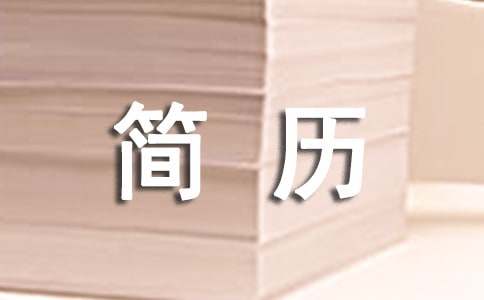- 相关推荐
英文求职简历书写的11个要求

毕业在即,很多同学都会考虑进外企,那么写一份夺人眼球的英文简历就必不可缺了。那么写简历时有什么基本要求,怎么样才能抓住重点,突出自己的优势呢?小编希望下面这篇文章能给大家以参考。
1. What is a resume anyway? 什么是简历?
Remember: a resume is a self-promotional document that presents you in the best possible light, for the purpose of getting invited to a job interview. It's not an official personnel document. It's not a job application. It's not a "career obituary"! And it's not a confessional.
2.What should the resume content be about? 应该在简历上写些什么?
It's not just about past jobs! It's about YOU, and how you performed and what you accomplished in those past jobs--especially those accomplishments that are most relevant to the work you want to do next. A good resume predicts how you might perform in that desired future job.
3.What's the fastest way to improve a resume? 完善简历的捷径是什么?
Remove everything that starts with "responsibilities included" and replace it with on-the-job accomplishments. (See Tip 11 for one way to write them.)
4.What is the most common resume mistake made by job hunters? 写简历时最常见的错误是什么?
Leaving out their Job Objective! If you don't show a sense of direction, employers won't be interested. Having a clearly stated goal doesn't have to confine you if it's stated well.
5.What's the first step in writing a resume? 写简历的第一步是什么?
Decide on a job target (or "job objective") that can be stated in about 5 or 6 words. Anything beyond that is probably "fluff" and indicates a lack of clarity and direction.
6.How do you decide whether to use a Chronological resume or a Functional one? 按时间顺序写简历好还是按技能或能力写简历?
The Chronological format is widely preferred by employers, and works well if you're staying in the same field (especially if you've been upwardly-mobile). Only use a Functional format if you're changing fields, and you're sure a skills-oriented format would show off your transferable skills to better advantage; and be sure to include a clear chronological work history!
7.What if you don't have any experience in the kind of work you want to do? 要是在你想要从事的领域没有任何经验怎么办?
Get some! Find a place that will let you do some volunteer work right away. You only need a brief, concentrated period of volunteer training (for example, 1 day a week for a month) to have at least SOME experience to put on your resume. Also, look at some of the volunteer work you've done in the past and see if any of THAT helps document some skills you'll need for your new job.
8.What do you do if you have gaps in your work experience? 要是发现在你社会经历中出现空白期怎么办?
You could start by looking at it differently. General Rule: Tell what you WERE doing, as gracefully as possible--rather than leave a gap. If you were doing anything valuable (even if unpaid) during those so-called "gaps" you could just insert THAT into the work-history section of your resume to fill the hole. Here are some examples:
1993-95 Full-time parent -- or
1992-94 Maternity leave and family management -- or
Travel and study -- or Full-time student -- or
Parenting plus community service
9.What if you have several different job objectives you‘re working on at the same time? Or you haven‘t narrowed it down yet to just one job target? 如果你同时有好几个职业目标怎么办?或者你一时之间无法做出选择怎么办?
Then write a different resume for each different job target. A targeted resume is MUCH, much stronger than a generic resume.
10.What if you have a fragmented, scrambled-up work history, with lots of short-term jobs? 如果你的社会实践多而杂,且时间短怎么办?
To minimize the job-hopper image, combine several similar jobs into one "chunk," for example:
1993-1995 Secretary/Receptionist; Jones Bakery, Micro Corp., Carter Jewelers -- or
1993-95 Waiter/Busboy; McDougal's Restaurant, Burger King, Traders Coffee Shop.
Also you can just drop some of the less important, briefest jobs. But don't drop a job, even when it lasted a short time, if that was where you acquired important skills or experience.
11.What‘s the best way to impress an employer? 最能吸引雇主的办法是什么?
Fill your resume with "PAR" statements. PAR stands for Problem-Action-Results; in other words, first you state the problem that existed in your workplace, then you describe what you did about it, and finally you point out the beneficial results.
Here's an example: "Transformed a disorganized, inefficient warehouse into a smooth-running operation by totally redesigning the layout; this saved the company thousands of dollars in recovered stock."
Another example: "Improved an engineering company's obsolete filing system by developing a simple but sophisticated functional-coding system. This saved time and money by recovering valuable, previously lost, project records."
【英文求职简历书写的11个要求】相关文章:
英文简历书写格式及注意事项11-17
英文简历模板(行政助理求职)11-16
项目管理人的英文原版求职简历11-16
求职信书写格式及范文11-22
书写求职信的关键要素12-02
外贸业务员英文简历求职信11-22
求职信书写注意事项11-21
求职锦囊:英文简历中绝不能出现的禁忌语11-14
名校生低调求职,要求月薪80011-10